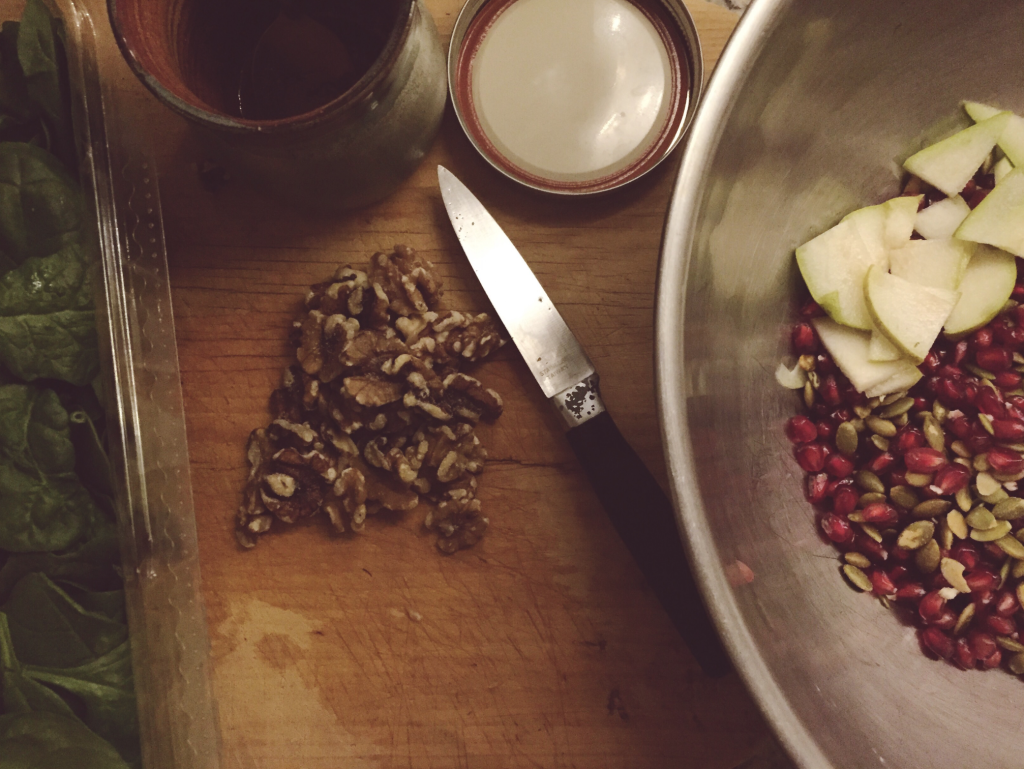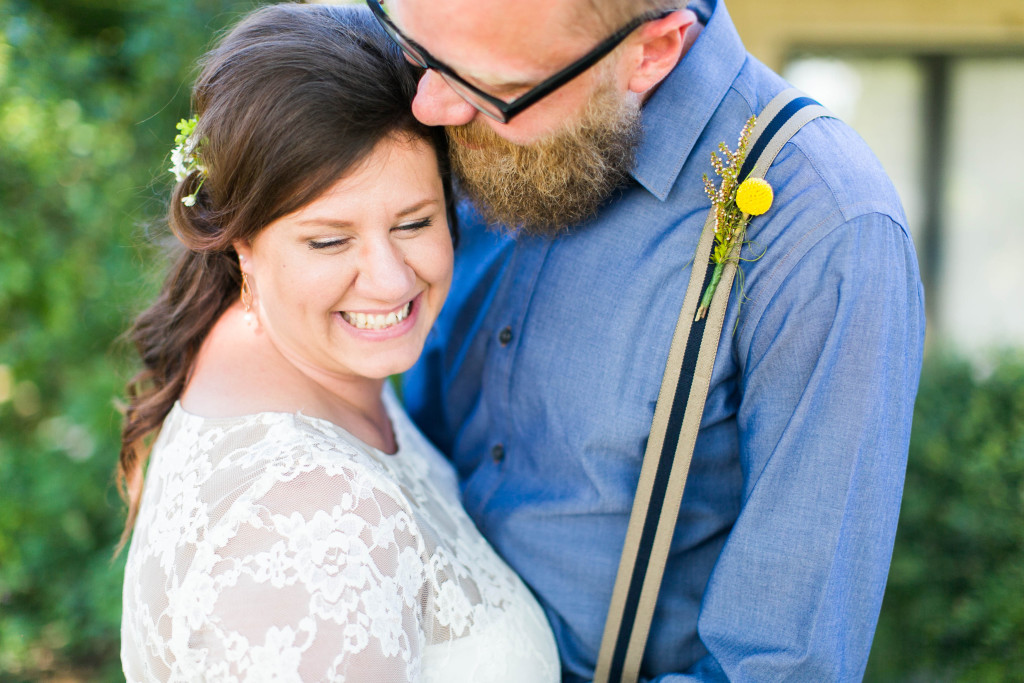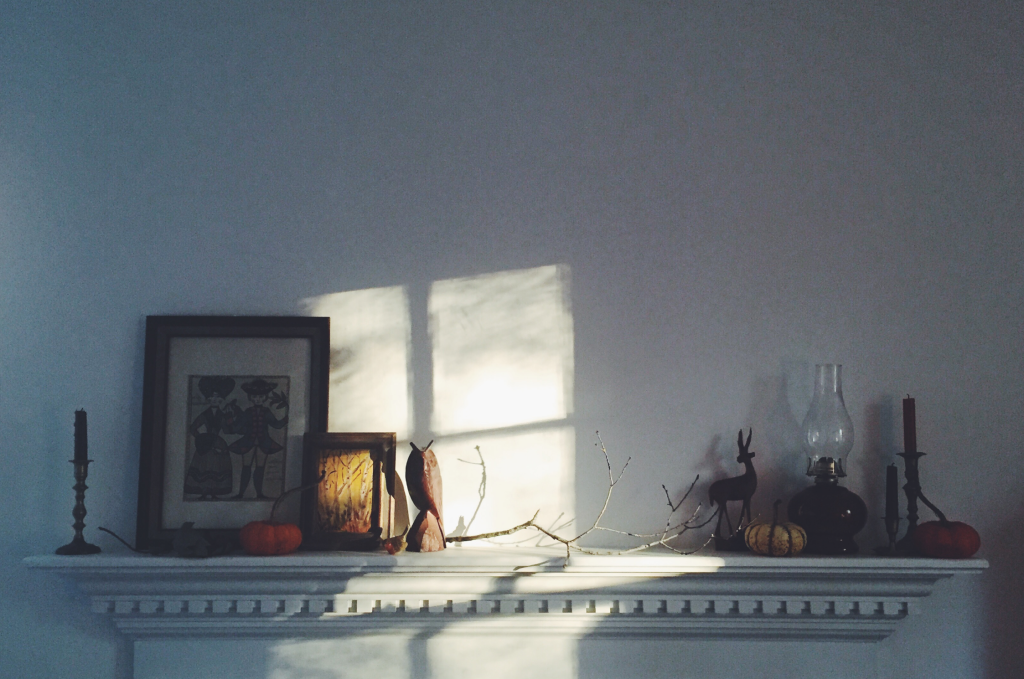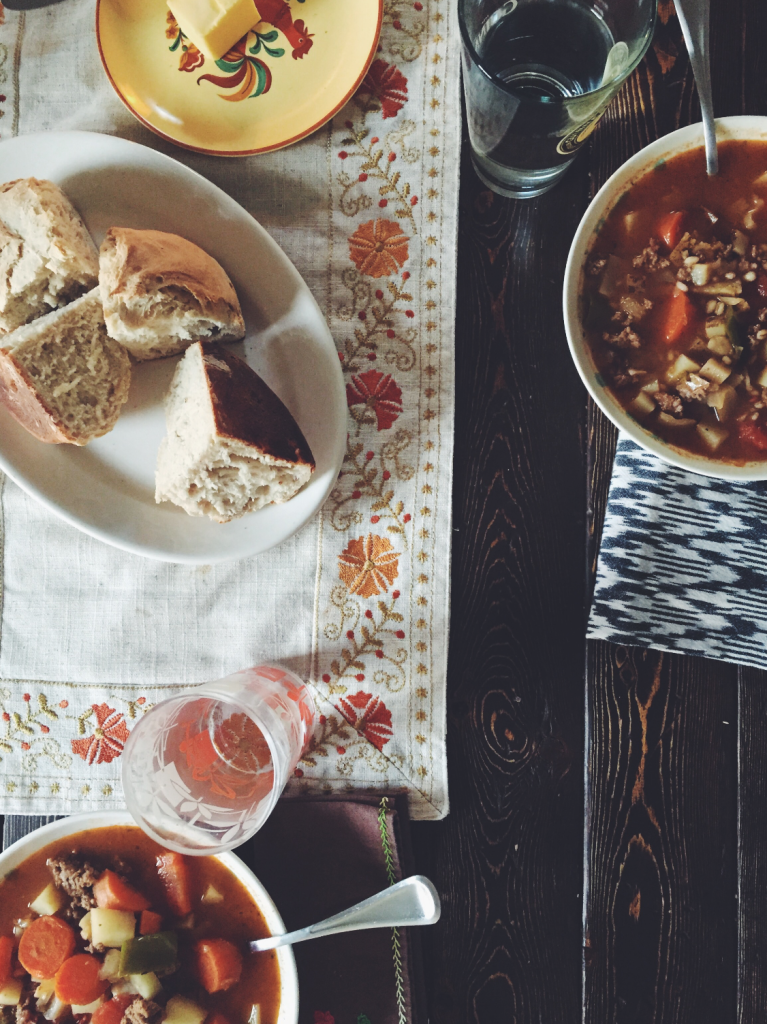The gift of hindsight is a blessed one in the life of faith. A friend told me once that faith isn't faith if you can see where you're going, so the presence of Ebenezers in our lives is a proof God knew we'd need them. "Oh, look!" we can say, pointing at the thing God did back then, "We know He must be aware and present and caring for us now just as He was then." And then we breathe and walk on through the storms and circumstances of today. Hindsight vision, in the Christian faith, is always 20/20.
It was with this expectation that I began a discipline in January of this year. When I began, I expected all the life-change we'd experienced in 2015—dating, engagement, marriage, moving, new church, new job, job loss, miscarriage—would begin to settle in 2016. I was wrong. 2016 brought more of the same, and much more difficult internal hardship than the external change of 2015. I look back now and see how God put this simple discipline in my path at exactly the right time and for exactly the right year. Never has there been a year of my life when what I would need most were small, simple, faithful disciplines.
In December of last year Ann Voskamp offered a free print-out of twelve verbs for the new year. Pursue, be, expect, give, and so on. You added the nouns yourself and so I did. I wrote out twelve index cards with twelve challenges on them and when the first of each month came, I prayed for wisdom about which one to choose next.
There were months this year, are still months this year, when breathing itself felt hard. Panic took ahold of my heart and mind, rendering me powerless against fear, insecurity, failure, stress, and sadness. I am no stranger to this panic and it was a close enemy of mine for years, but it has been far from me for the past six. In 2016 it came back with a vengeance and left nothing untouched. Normal, everyday acts become fearful. Faithful commitments have become difficult. Simple relationships have been terrifying. Much of that had to do with the instability of our lives the past year and a half. I have been afraid to move my feet in any direction, even planting them deeper, for fear. There's a lot people don't know and many have made assumptions about our direction, church search, the reasons we want to be planted in one home for at least two years, our desire to be out of D.C., and more. It has often felt like even voicing my fears brought more judgement and so it was just better to be quiet. These small disciplines again and again and again reminded me of the One Thing I could do today by the Spirit's help.
I don't know where you are or what kind of year you've had or want to have. I don't know how unmoored and unanchored you feel. I don't know what you're afraid of or excited about. But if you're struggling to pick up your feet, your head, your eyes, or your heart, this might be a small discipline you can do with the Spirit's help. He helped me this year. I tacked these index cards above three different sinks in three different places we lived this year and every day when everything around me was shifting and turning, I would remember and breathe and do what the card said.
If you're looking for a small, simple, easy way of pursuing stability in an uneasy world, here's Ann's post with the free printout from last year. Below are each of my cards, and how the Lord worked in my heart with the discipline on them. Feel free to read on, or stop now. I record them here mostly for my own benefit and remembrance, but also because I hope you are encouraged by my Ebenezer.
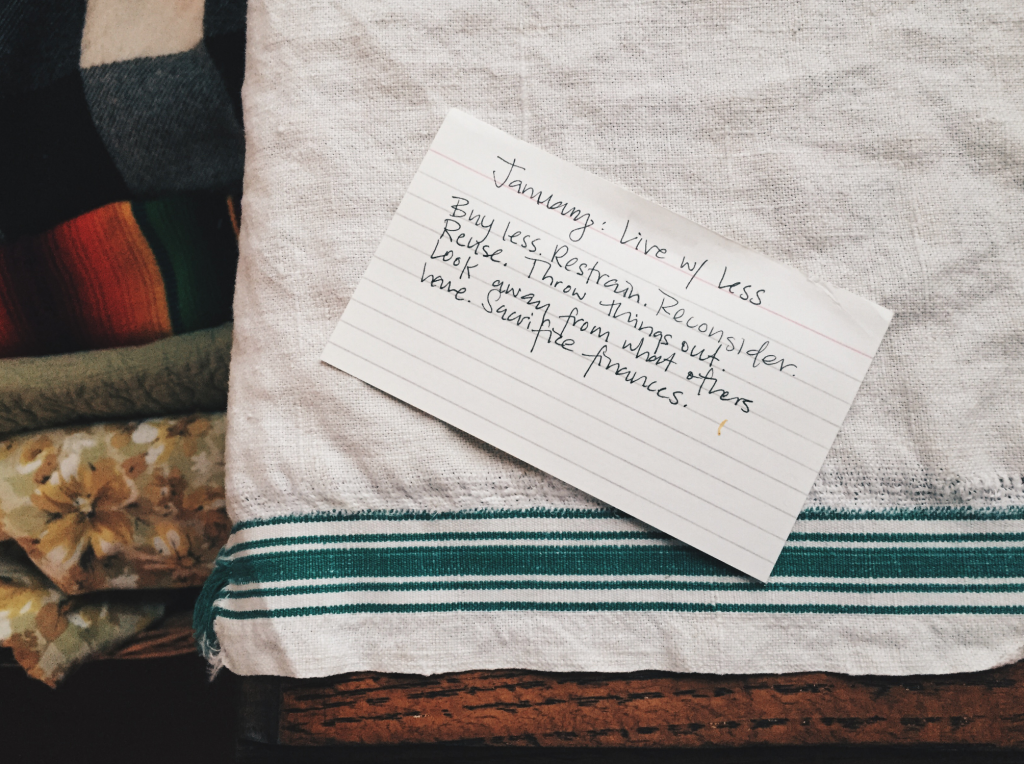
J A N U A R Y : Live with Less
We were nearing the end of our savings account after four months of Nate's unemployment and no job on the horizon. Pinching pennies everywhere. I have always been frugal, but I had never had a mortgage or a husband to be so affected by our financial situation. Learning to live with less in every way pressed into me not simply with a budget, but learning to ask the question: do we actually need this? or have we just grown used to having it? Things like good coffee, craft beer, grass-fed meat—these were luxuries we just couldn't have. And we were okay. God was our provision, we would say to one another often in January. Not my paycheck. Not Nate's. Not our savings account. God alone.
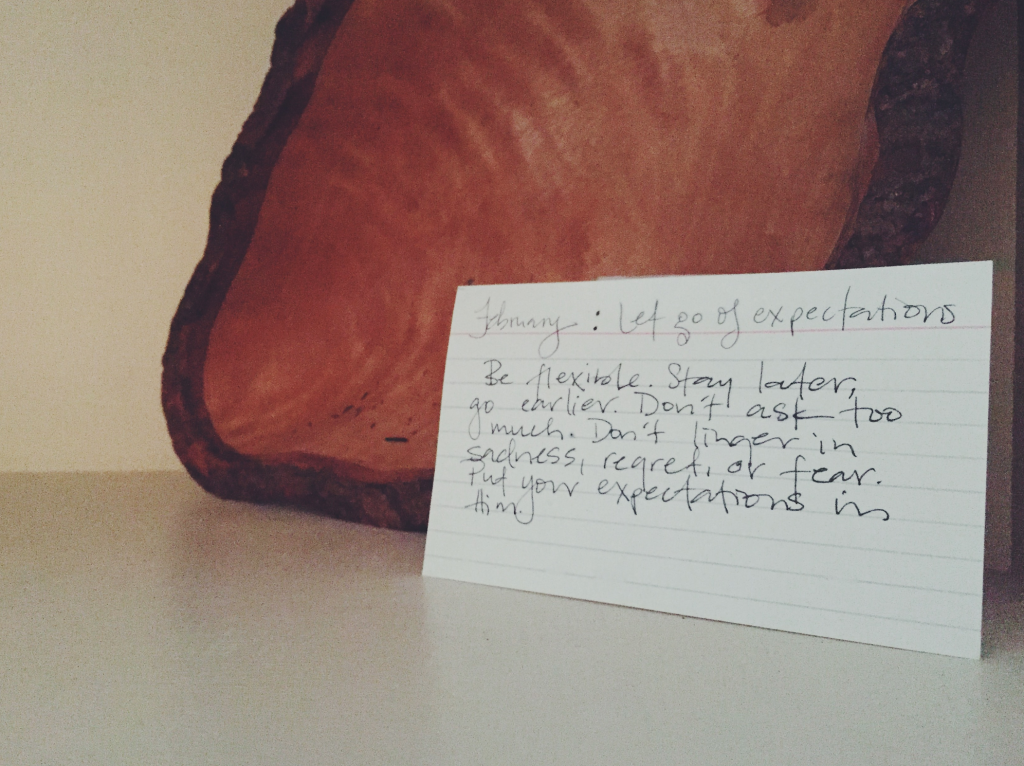
F E B R U A R Y : Let go of expectations
In early February, although we tried hard, the only job offer was in D.C. We bought our house in Denver planning to stay there forever. As we began to pack boxes and explain our early departure, I was mourning deeply in my heart, not only my own expectations, but others. It was during this month Nate and I began to say to one another almost daily to this day, "We can only be faithful to the Word of God, not to an outcome." We had many expectations during the month of February and I think it's safe to say not one of them happened in the way we wanted it to, but God.
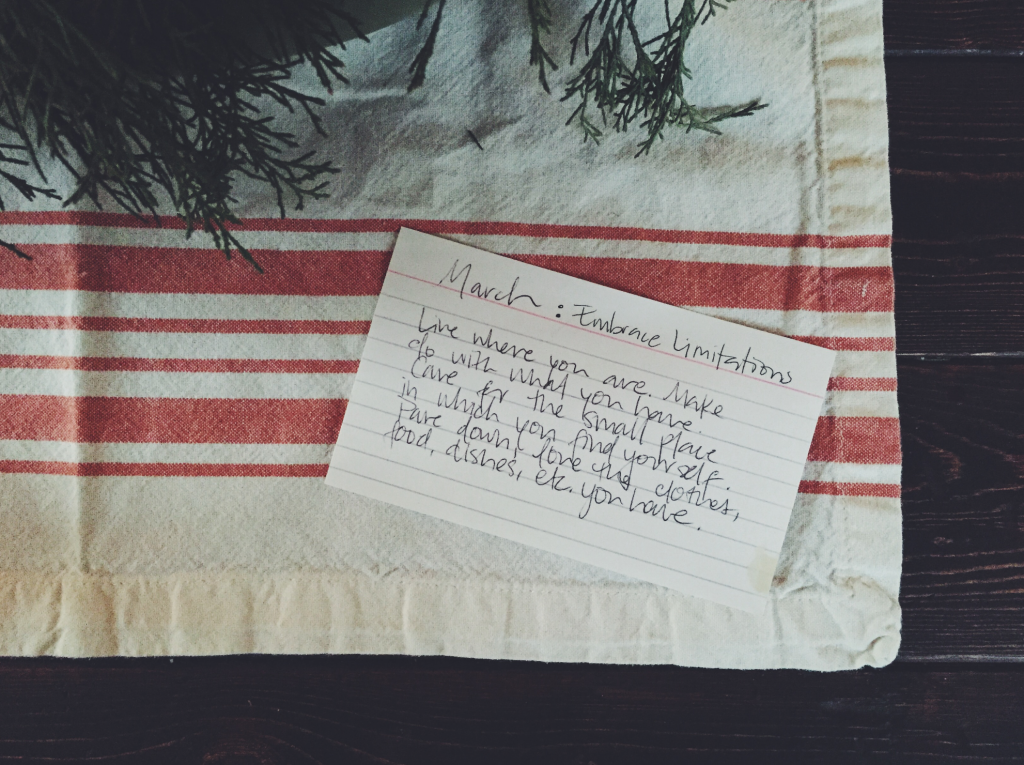
M A R C H : Embrace Limitations
March came in like a lion and went out like one too. We spent five weeks living above a stranger's garage on the edge of D.C. Everything was new and foreign and frightening for me. Nate was gone from dusk until dawn. We knew no one. Everything took longer because traffic was nuts. I was trying to learn the metro system. I was afraid of being home alone and was home alone all the time. We heard gunshots and sirens at all hours of the day and night. All of our stuff was in a storage unit in a dangerous part of town so, once again, we were living out of suitcases (less than eight months earlier, we lived out suitcases in an AirBnB for six weeks in Denver too). I felt my limitations in a way I've never felt them before and just had to learn to embrace them. God was teaching me to drop my expectations of what our life would look like, and put my hope in Him.
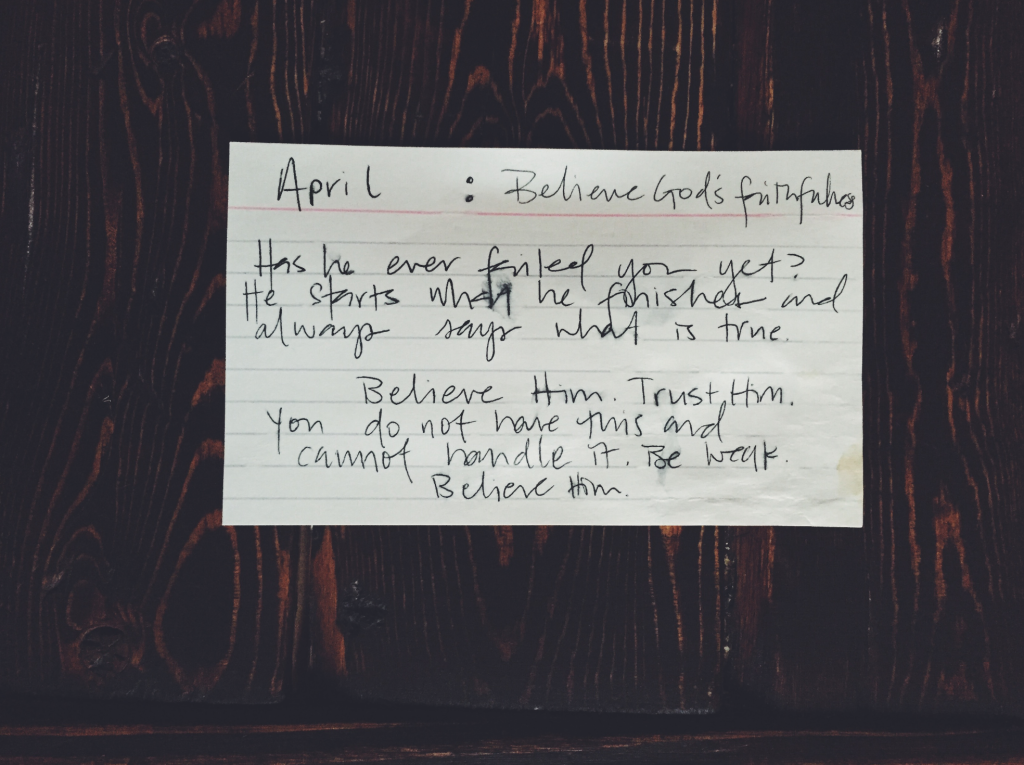
A P R I L : Believe God's faithfulness
By the end of April, we had five different buyers sign a contract on our house in Denver and all five backed out with little to no reason. We were hemorrhaging money at this point and were looking down the road at foreclosure. Everywhere we looked it felt like we were being taken from, stolen from, and lied to. I look back now and know with absolute confidence no one had malicious intent, but have you ever just been in a place where you felt like that? That's what April felt like. The poet said, "April is the cruelest month," and for us it seemed true. I had to remind myself daily that God was faithful, and all that was required of me was to believe His faithfulness, even if I didn't feel it.
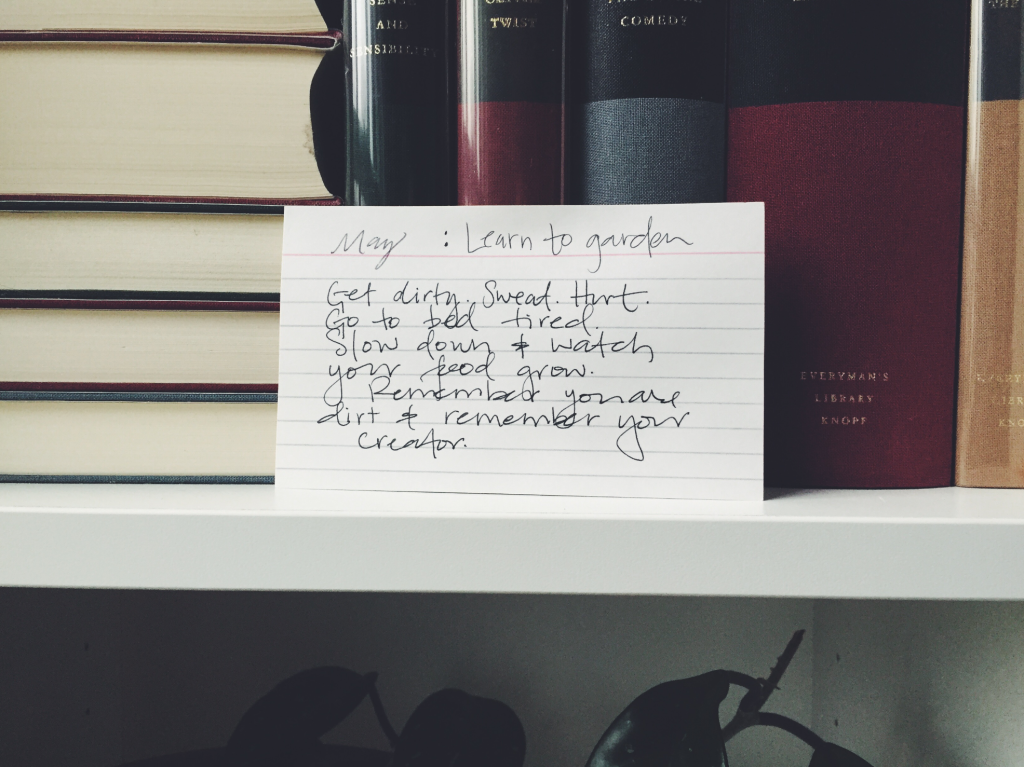
M A Y : Learn to garden
I have not always liked to garden and have not learned to do it well, but a wise man once said, "If you work with your head, sabbath with your hands. If you work with your hands, sabbath with your head." So much of 2016 was me alone with my head and I knew I needed to just do something with my hands. We were still bleeding finances though, and even buying a small packet of seeds felt like an indulgence I couldn't justify. We did our best to clear out some overgrown gardens in the front yard and plant some little bits. I also went home to New York and brought back a plethora of raspberry plants, lilac shoots, and other things from home to put in our yard. We didn't know how long we'd be in this house, but I wanted to do my best to do the physical act of planting in hopes that it would grow some roots of another kind in my heart.
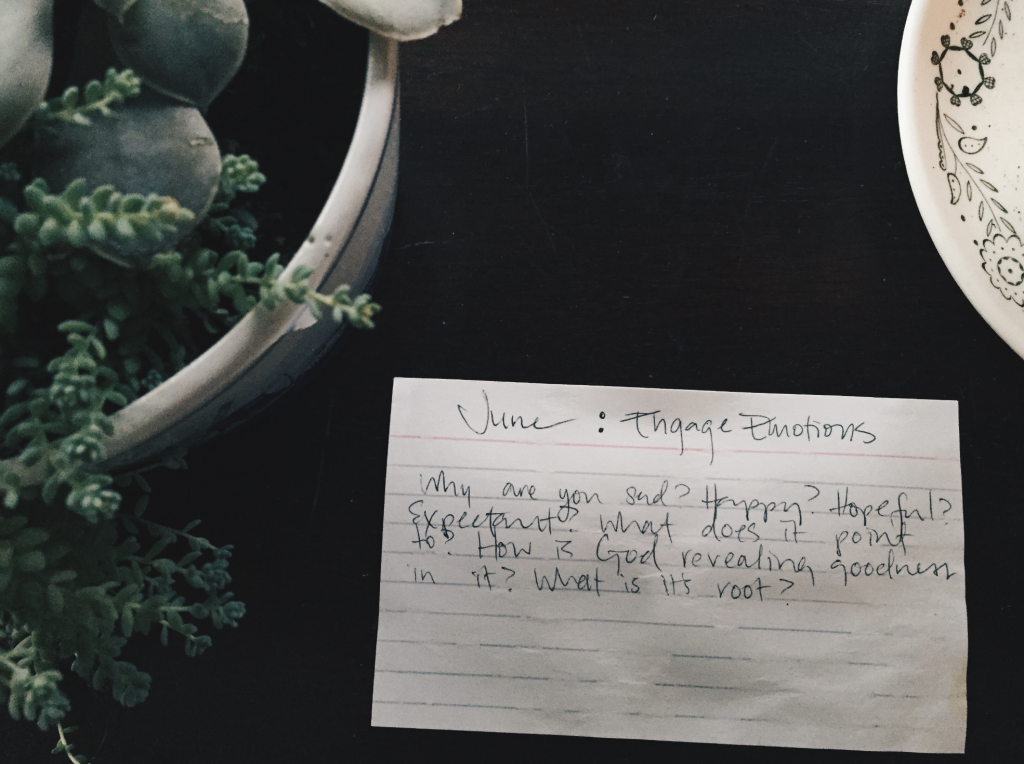
J U N E : Engage emotions
I think I can safely say this was one of the most challenging challenges of my year. For all the writing about emotions and the soul and such that I do, I'm actually pretty terrible at engaging my own emotions. I fear being too emotional, or driven by my emotions, and so it seems easier to just ignore them altogether. Nate and I began seeing a counselor in June, though, because our first year of marriage had been so emotionally fraught with pain. In our first meeting, our counselor said after hearing us talk for a bit, "You guys are both clearly very intelligent, very smart people, but I wonder, do you feel anything?" It was like the floodgates opened in me then, and the entire month of June I cried. I'm not exaggerating. I cried every day. It didn't feel productive. It felt wrong. And yet it also helped me to feel period. I was able to start mourning some of the Really Hard Things from the year. I reminded myself daily that God wasn't surprised or ashamed of my emotions, that he made me and loved me.
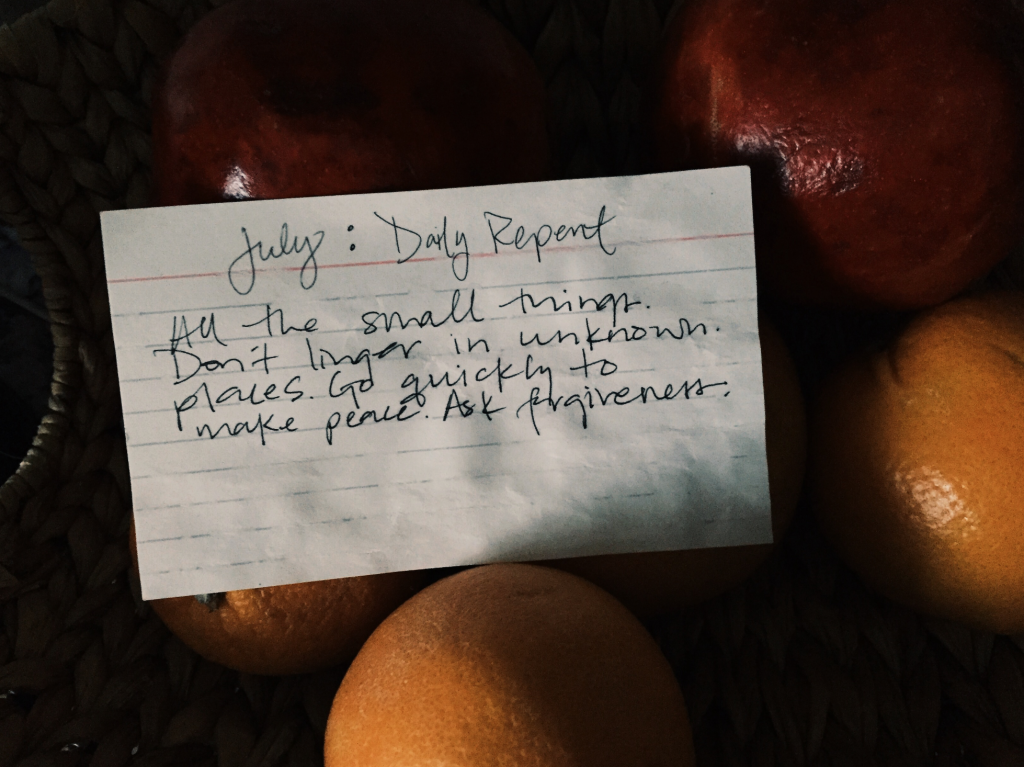
J U L Y : Daily Repent
After the emotional dam broke in June, I found July to be a month of repentance. Mostly to God, but also to Nate. It felt like every day there was another conversation about how I failed to communicate, serve, be honest, etc. He is endlessly patient with me, and always forgiving before I need to ask, but July felt like a mac truck hit me and I took him down with me. I think July was a month when I learned what a godly and faithful man God had given me. I thought I knew it before, but July it really sunk in. I was a miserable wreck.
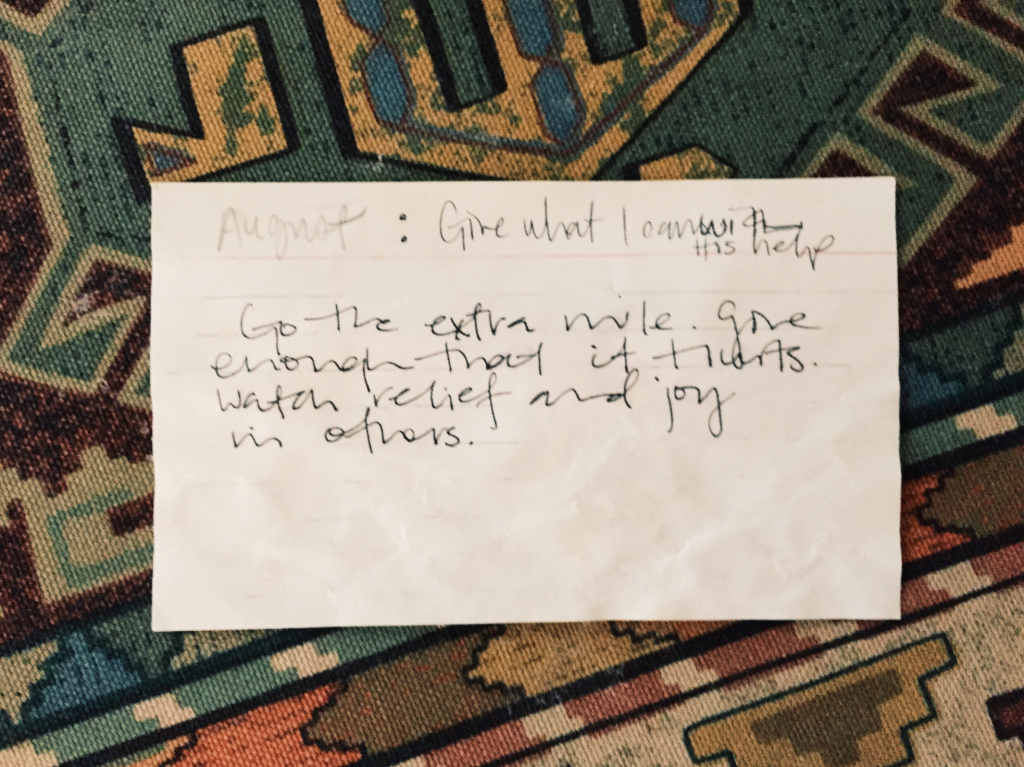
A U G U S T : Give what I can with His help
In August we were finally back in the black financially. We still weren't bringing in anything extra, we had sold the house, losing nearly 100k, but were able to pay off the debt we'd incurred to the penny. I knew we were able to breathe a bit financially, but I'd grown so used to not buying anything that the thought of giving anything away felt scary. God had to unclench my fingers around our resources again and teach me to give out of the grace we'd been given. He also taught me to pay attention to how our giving affects others. I think in western Christianity, we like to give anonymously, and I don't think that's always wrong, but there's blessing too in being able to rejoice with others when their need is met. This was a good lesson for me in August.
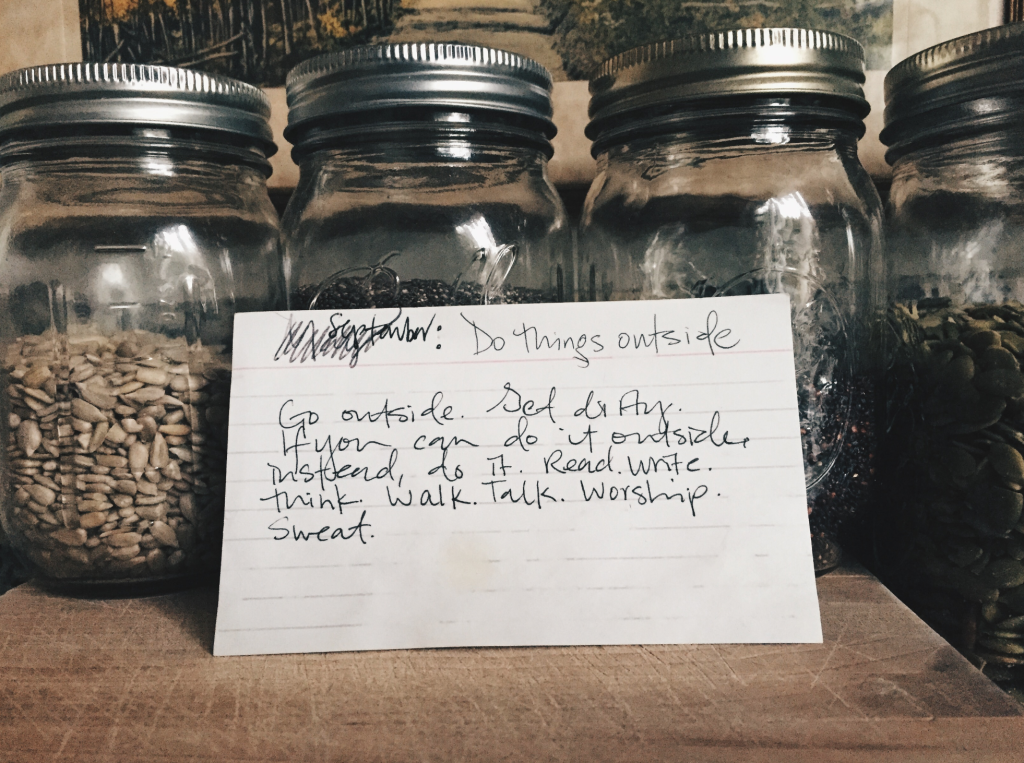
S E P T E M B E R : Do things outside
September weather in Virginia was hot and humid, and I'd hoped to be able to do more outside in September, but with a puppy who can't abide temps over 70 degrees, my options were limited. I tried to sit on our back porch and work as much as possible, and walk Harper (drag Harper) a couple times a day. I love being outside and so this month didn't feel too different than other months. It was a good reminder to be intentional about it though.
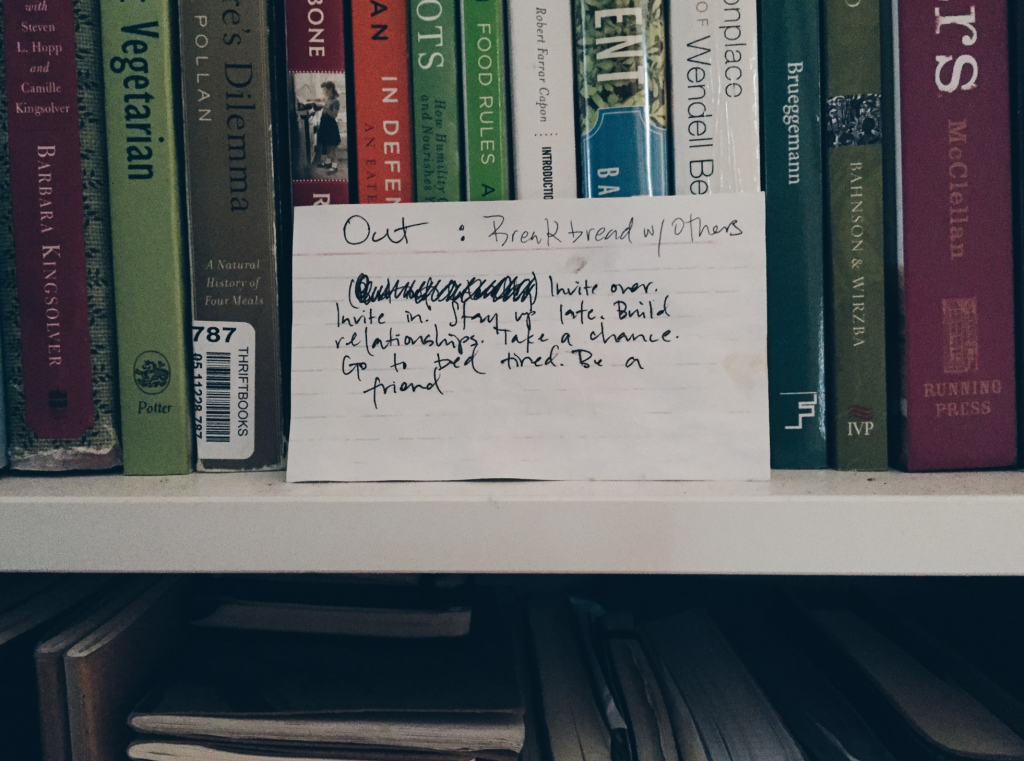
O C T O B E R : Break bread with others
At this point in our year, we knew that staying in D.C. wasn't going to be a long term plan for our family. Nate's commute is at minimum three hours a day, at least once a week it gets up to four hours. This seems to work for some families, but that, combined with the cost of living here and a few other reasons, made it clear to us that we couldn't stay here. We have tried to be faithful to open our home to new friends and make a place at our table for anyone. We've found it harder here than we expected, and I think a lot of that is because we and others know we're not here long term. This was a challenging card for me because I think it was the first card I really didn't want to do. I was exhausted from trying to build relationships in Denver and then leaving them, and now knowing we'd be leaving again, I felt like it just didn't matter. God used the presence of one family in particular here, though, to soften my heart. We don't see them as often as we saw friends in Dallas or Denver, but knowing they're here, and we love them, has been enough sometimes. What did happen a lot in October, though, is we had a revolving door of out of town friends and family. I changed the guest room sheets no less than eight times during October and that itself was a blessing. God knew this challenge wouldn't look like what I hoped, but it would still be a good challenge for October.
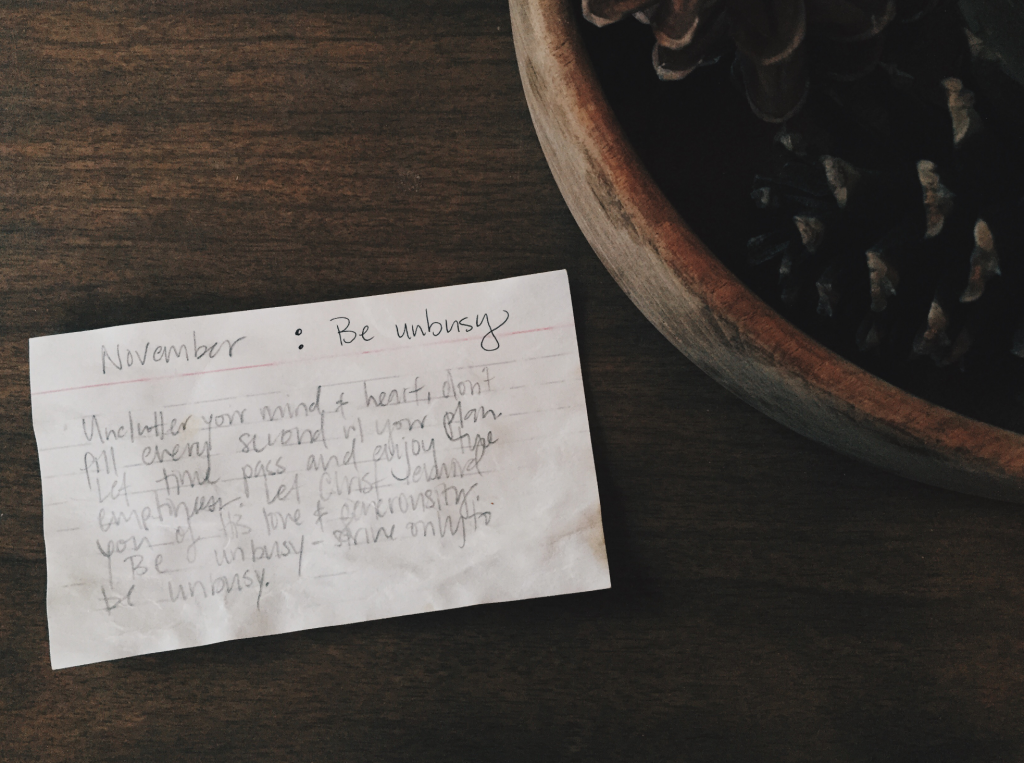
N O V E M B E R : Be unbusy
After the busyness of October and the looming deadline of a big project for me, we called a moratorium on visitors for November. I didn't let email, phone, writing, people, or chores master me. I had two objectives, to finish my deadline and to love my husband well. I didn't listen to podcasts, read articles, read the news, read Twitter or Facebook. I didn't talk politics with anyone. I just kept my head down and worked. And at the end of the month, the world still turned just as faithfully as it has since creation. Who knew?
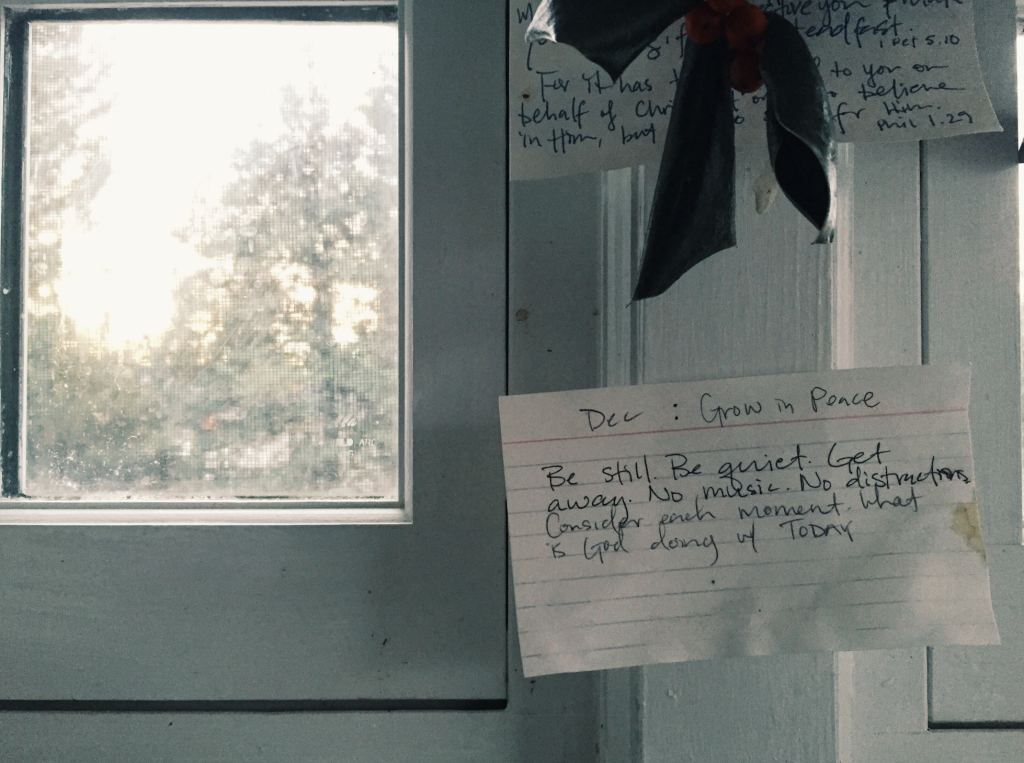
D E C E M B E R : Grow in peace
We are still in December, obviously, but already I have been learning about the steadfast love of the Lord never changing. Our year has been full of transition and it has not been easy. I want nothing more right now than to be rooted, anchored, moored, and planted. My wildest dream in the world right now is to live in the same house for two years. Partially because we want to start the adoption process, but partially because I just want to be still, have community, build relationships, invest in and be invested in. But God has not unveiled His plan to us yet, and so all I can do is say, "God, You still hold tomorrow. Give me the gift of peace today." And it is enough, it really is.






 I have been reading the book of Job this month and I am encouraged by it in a way unlike ever before. I've struggled with Job in the past, either I didn't want my joy tinged with his suffering or I didn't want my suffering spiraling down more. But God, in his goodness, has me reading the whole book this month and every morning I am struck more and more by the deep wells of truth in it. His friends did some things right and said some things wrong. Job did some things right and said some things wrong. It is not a prescriptive book, it is descriptive of Job's life and walk with the Lord, but it can be a comfort to us in its descriptiveness.
I have been reading the book of Job this month and I am encouraged by it in a way unlike ever before. I've struggled with Job in the past, either I didn't want my joy tinged with his suffering or I didn't want my suffering spiraling down more. But God, in his goodness, has me reading the whole book this month and every morning I am struck more and more by the deep wells of truth in it. His friends did some things right and said some things wrong. Job did some things right and said some things wrong. It is not a prescriptive book, it is descriptive of Job's life and walk with the Lord, but it can be a comfort to us in its descriptiveness.